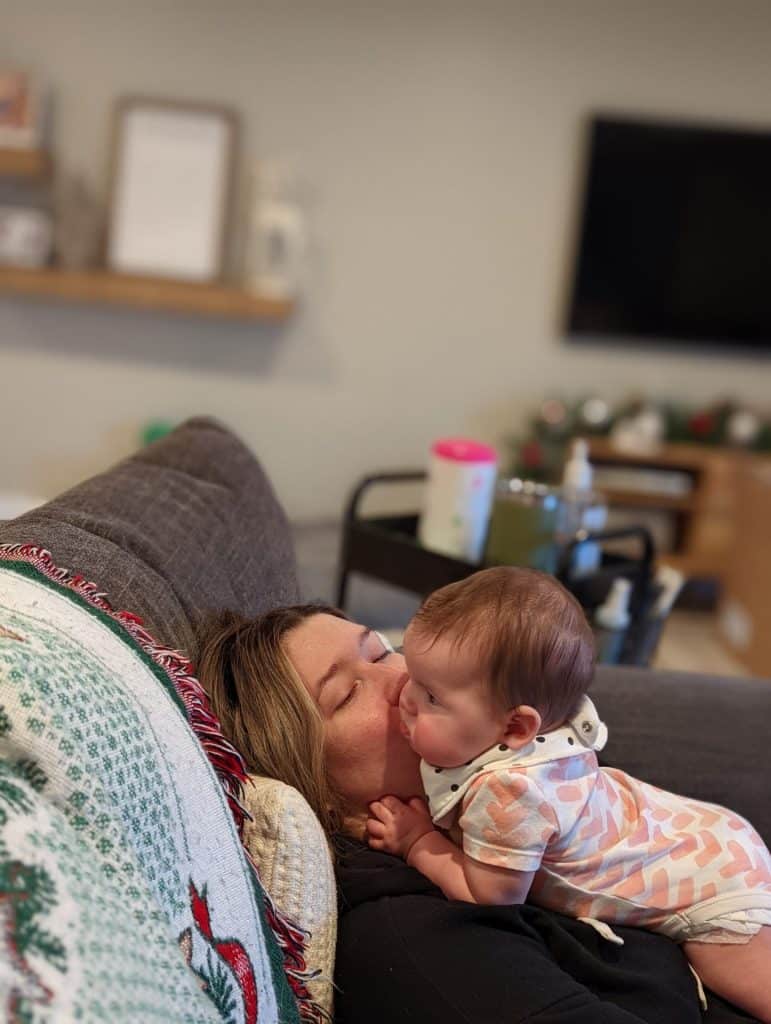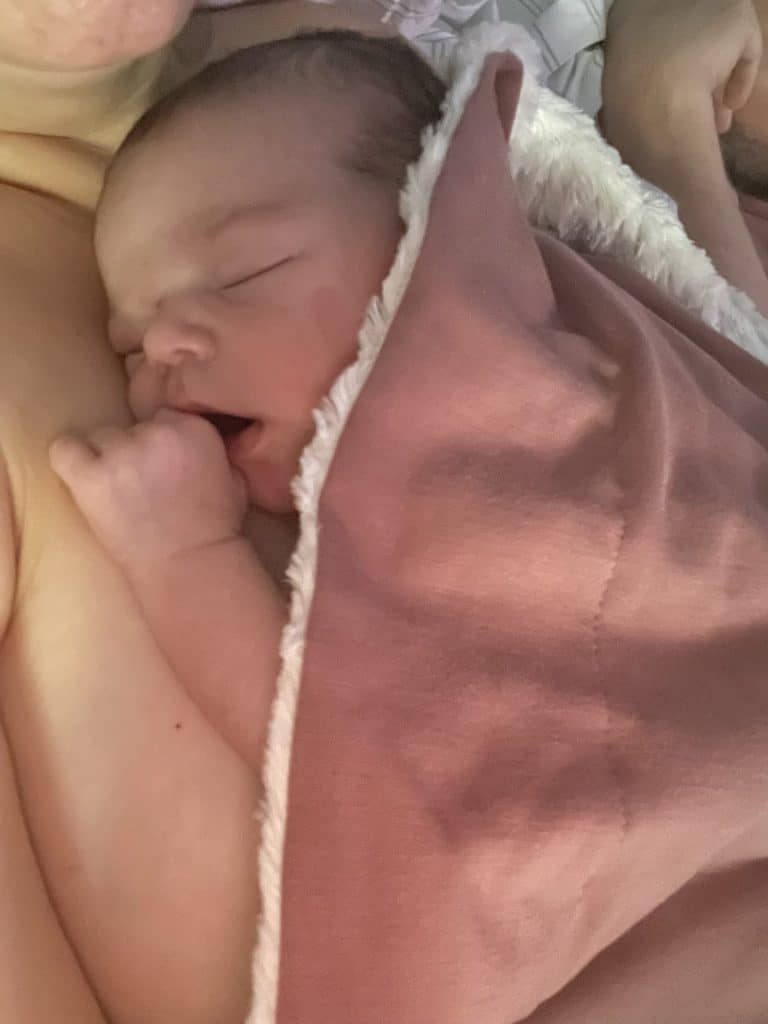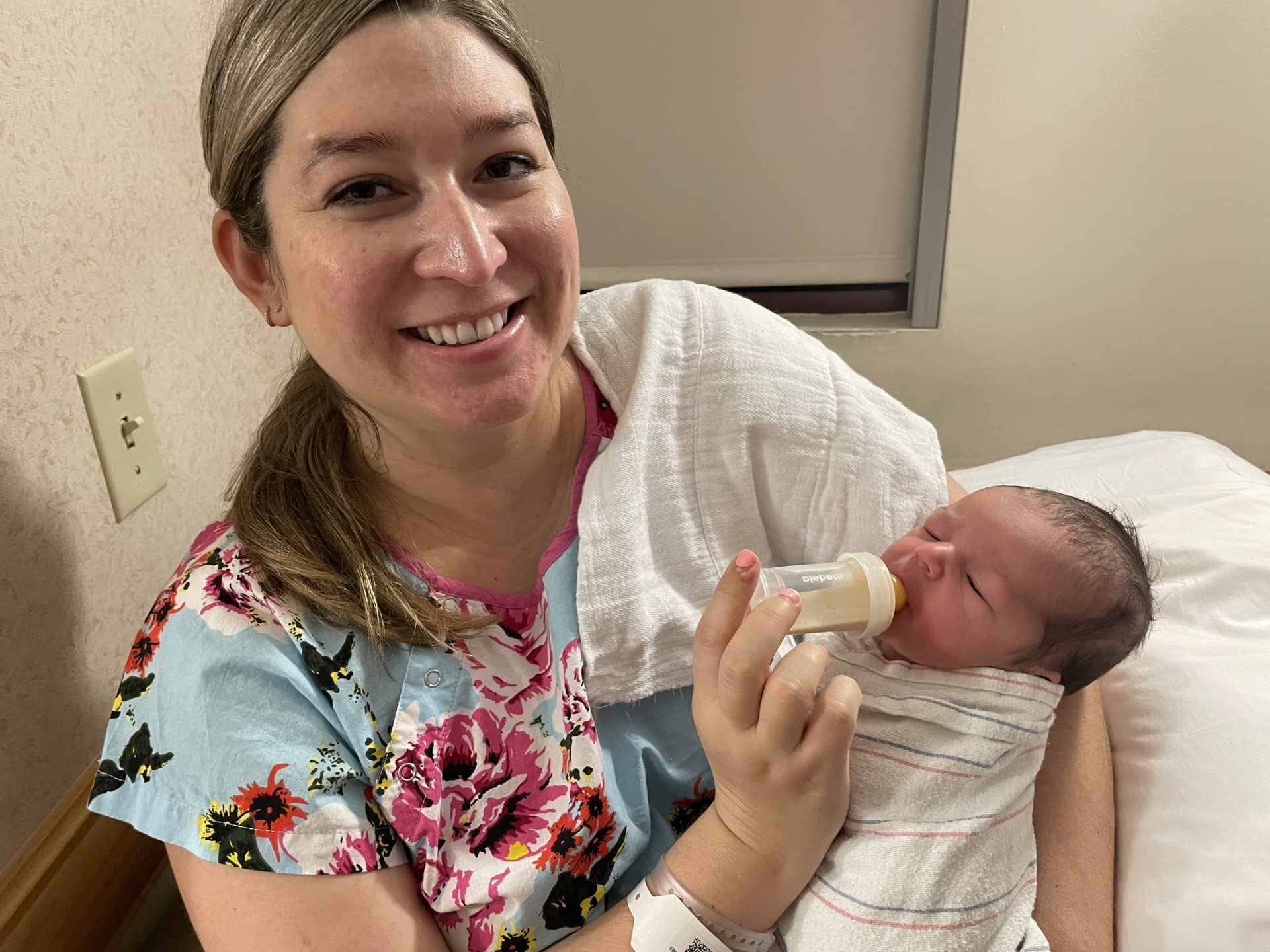We are proud to say that these posts are not sponsored. Our editorial team of Bobbie moms and writers personally select each featured product. If you buy something through our links, we may earn an affiliate commission, at no cost to you.
“Do you want to try breastfeeding?” asked the nurse. I was wrapped in an unfamiliar hospital blanket with my fresh, hours-old baby on my chest. Having just endured a surprise c-section, I had no idea what breastfeeding would be like after undergoing surgery of my own. I wondered— do c-section babies have a harder time breastfeeding?
“Sure!” I answered enthusiastically. I wondered what it would feel like as the nurse helped Lucy get adjusted onto my breast. Only seconds into what was supposed to be a magical experience, I let out a sharp-pitched scream.
I pulled Lucy away from my breast and noticed a small trail of blood trickling from my nipple. I remember thinking, how was this possible, she didn’t even have teeth! The nurse explained that sometimes nipples can be extra sensitive and that it was normal.



“She’s probably hungry, do you want to try the bottle?” Her tone was so matter of fact and reassuring that I didn’t bat an eye over it. I glanced at my husband who reassuringly nodded his head and we gave her the baby formula that the hospital had on hand. I didn’t want her to be hungry after the long, strange road to the outside she had just been through.
Lucy happily and easily drank from the bottle and my husband and I took turns feeding her, in awe of the beauty of this familiar stranger that was now part of our lives.
That evening, the night nurse came in while I was bottle feeding Lucy. Before she even introduced herself, she exclaimed “You have her on the bottle already?! She’ll NEVER breastfeed now!”
I panicked, as her demeanor was completely different from my day nurse. I practically threw the bottle across the room and frantically tried to adjust her on my breast.
“THIS BABY WON’T LATCH!” she boomed to the room. “In my 20 years as a nurse, I’ve never seen a baby that won’t latch.”
I was in tears and my heart was sinking further into my chest. Only several hours into parenthood and I had already failed. Over the next few days of our hospital stay, we never saw the lactation nurse. She turned up 15 minutes before we were checking out and hurriedly showed us the pump, said to try nipple shields, then sent us on our way.
The week that followed was filled with anguish, anxiety, and disappointment. I didn’t know how to breastfeed and felt that I had ruined the experience. I pumped every three hours around the clock and was lucky to be a producer, albeit an exhausted one. After the seventh consecutive night of me crying on the couch that I had failed Lucy, my husband booked us an appointment with a lactation consultant.
The warmth and embrace of this experience will stay with me forever. The lactation consultant told me it was a process and that the baby was learning along with me. She helped me get fitted for the right flange size, showed me how to hold her for feedings, helped me learn how to use the nipple shields, and gave me a manageable pumping schedule. She told me I wasn’t a failure and even with her three kids, it was like the first time every time.
Breastfeeding at home went better, although I still wasn’t having that magical experience. You know the one— where the mom is laying sideways in bed and the baby is blissfully feeding right alongside her? My reality was much different.
I always had to use the My Brest Friend pillow, my nipple shields, a timer to make sure she was getting enough from each breast, and have my husband or mom strategically hand her to me. The first few minutes were always spent with Lucy screaming at my nipple and me staring down at the side of her head while she ate, silent tears streaming down my face as I wondered when the magic would appear.
After three months it was getting too hard on my soul. I cried every single day, multiple times a day. I cried when I woke up, I cried myself to sleep. I cried as the minutes inched closer to the next feeding. I cried as I pumped. My mind couldn’t shut off and I always had to be doing something, anything. There was no napping when the baby napped; not for lack of support but because I could not ever relax. I had to be moving, going. I kept my phone turned off because the sound of a ping made me jump. Every day was Groundhog Day and I couldn’t see that this was just a moment in time. This felt like my forever, a new life where I had no control, felt drained and disconnected from my baby and everyone around me. I realized this wasn’t baby blues, it was full on postpartum depression and postpartum anxiety.
I decided I could not continue to breastfeed and pump. It was too much and I knew it was driving my PPD/PPA. I had no resources to safely stop breastfeeding / pumping , so I returned to the lactation consultant in shame and asked for help on how to stop— apologizing for seeking her out to advise on something that was against what she did.
“Whether you breastfed for one minute, one hour, one day, one week, one month, one year, you did something amazing for that baby and you should never feel guilty about it,” she told me.
We came up with a plan to wean and for a while lived in the dreaded triple feeding world of breastfeeding, pumping, and formula. As the milk flow lessened, my mental health rose. The tears became less frequent and I was able to relax. Lucy chose to stop feeding from me one morning when she pulled away from my breast in frustration and gratefully drank the bottle of formula my husband gave her.
I remember when I gave her the bottle for the first time after I was done breastfeeding and pumping. Rather than staring at the side of her head, I was cradling her in my arms and staring into her ocean blue eyes. She made the content “k-ah” noise as she guzzled and I breathed a sigh of relief. This was that magic moment I had been waiting for, feeling completely connected to my baby with hope and relief in my heart.

